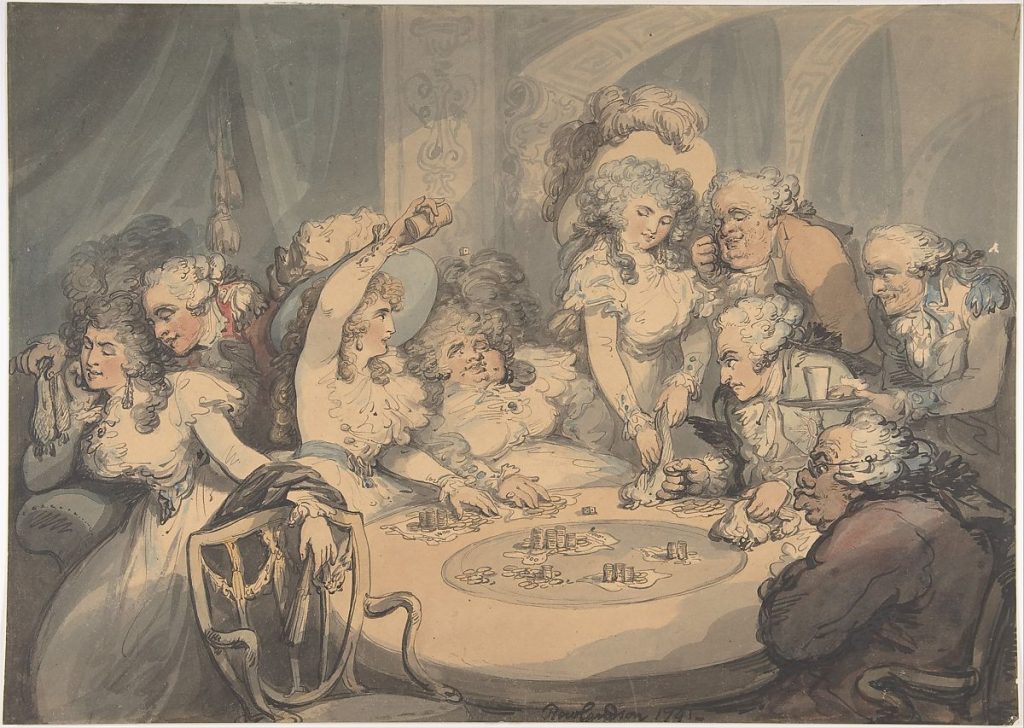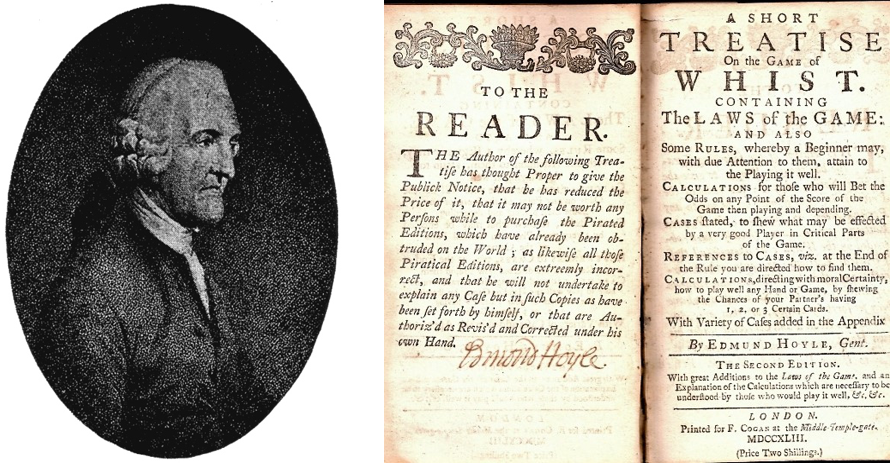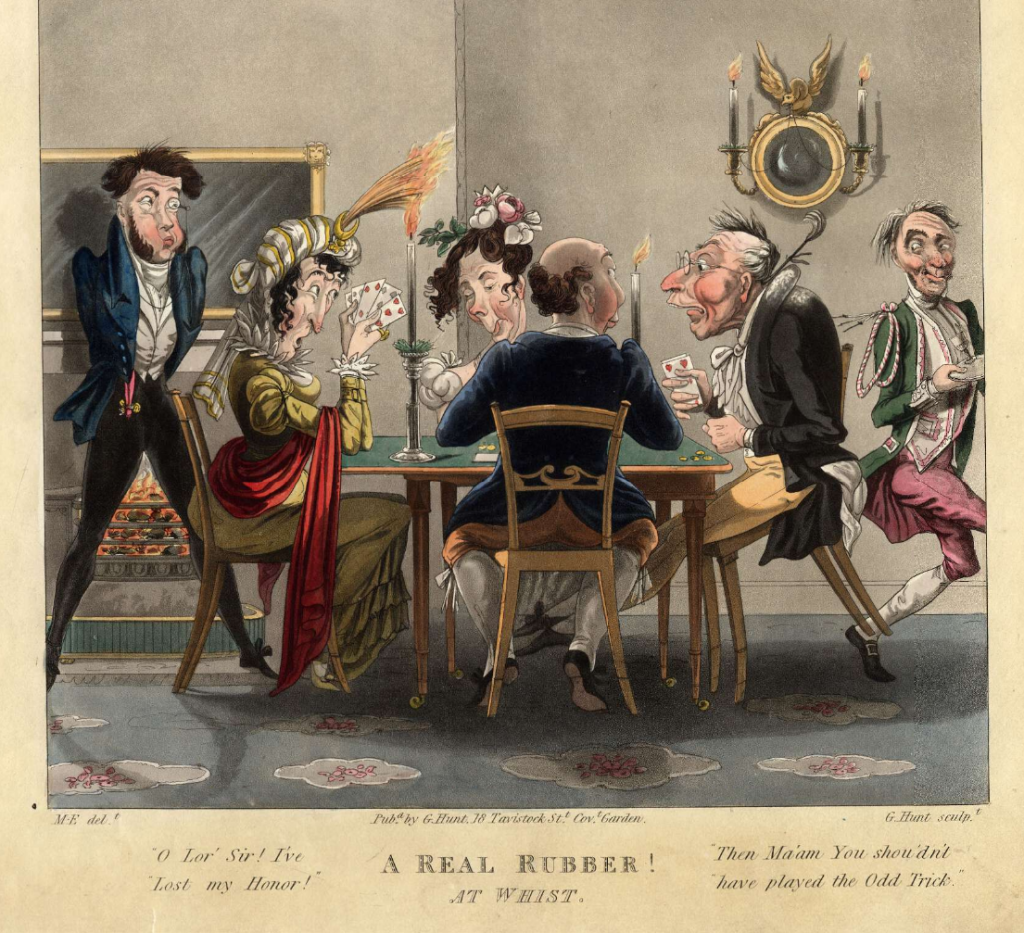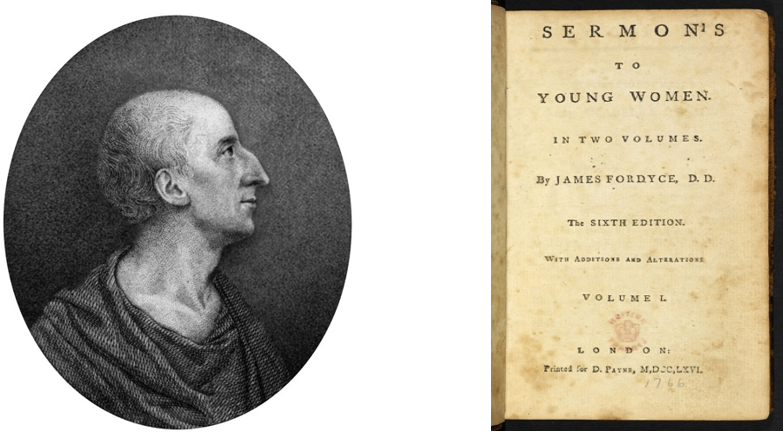Our latest blog post by Tino Oudesluijs explores the social significance of card games as documented in the Mary Hamilton Papers
In Mary Hamilton’s lifetime, indoor games gained much popularity throughout England (as they did in the rest of Europe), to the point where almost everyone in society, be they a servant or the King, was playing them (Olsen 1999: 165). Indeed, throughout the Mary Hamilton Papers archive, writers refer to a variety of games they played on different social occasions, from board games such as chess (see e.g. HAM/1/7/7/3, HAM/1/14/24) and backgammon (e.g. HAM/1/2/19) to roulette-like games such as ‘biribis’ (biribi, or biribissi in Italian, cavagnole in French) (HAM/1/4/5/12).

‘A Gaming Table at Devonshire House’ by Thomas Rowlandson (1791). The image depicts the Duchess of Devonshire, Georgiana Spencer (1757-1806), on the left about to throw her dice, and the Prince of Wales, George IV (1762-1830), wearing the star of the Order of the Garter, on the right.
In Mary Hamilton’s social network, card games were clearly the more preferred past-time, as mention is frequently made of ‘card parties’, ‘(playing) cards’, etc.:
I was in waiting & was sent for to make a party at Cards The King Queen Lady Hartford Lady Weymouth at one Table — at the other Princess Royal Princess Augusta Lady Charlotte Finch & myself — their Majesties were particularly affectionate & attentive to me (Mary Hamilton to the Prince of Wales, GEO/ADD/3/83/47)
When the Duke and company rose, and he, made his excuse hoping he should be excused as an invalid, for going home so early, took his leave. country dances then began, and the usual entertainments took place; of cards, &c it was very full, though I don't think the company very brilliant (Wilhelmina King to Mary Hamilton, HAM/1/7/7/4)
Card parties were an important activity in eighteenth-century England, not only because they provided people with a form of entertainment during various social events, but also since much networking (not to mention gossiping) could be done over a game of cards (Mullin 2015: 63). However, many people, including Mary Hamilton, disliked playing cards, and as it became increasingly popular over the course of the eighteenth century, many more would voice their worries of the possible dangers to people’s health, temper, and spirits (as well as, of course, their wallets).
In this blog I briefly highlight and discuss some interesting remarks and stories surrounding card games from the Mary Hamilton Papers archive, in which it becomes clear that, even if you dislike playing them, they can still be beneficial (especially when you refrain from betting).
Card games and the rise of (rubbers at) Whist
Besides referring to the act of playing cards, the different games themselves are also frequently mentioned and described in the Mary Hamilton Papers archive, notably Whist (e.g. HAM/1/13/45), Commerce (or ‘Commers’), also known as ‘Trade and Barter’ in English (e.g. HAM/1/3/6; HAM/1/12/26), Tred(r)ille & Quadrille (e.g. HAM/1/2/14; HAM/1/19/31), Pope Joan (e.g. HAM/1/15/1/17, where Charlotte Margaret Gunning admits to Mary Hamilton to cheat at this game), Cribbage (e.g. HAM/1/15/2/4) and Casino (HAM/1/2/56).
The popularity of these card games in England in the second half of the eighteenth century is reflected in the many publications describing their rules, most notably by Edmond Hoyle (1672-1769), whose name is still invoked in the phrase ‘according to Hoyle’, meaning ‘according to the highest authority, in accordance with strict rules’ (OED, Hoyle, n.2). His treatises on Whist, Quadrille, chess, etc.,[1] as well as his later publications comprising multiple games, were so popular that he personally signed all copies of his later editions to indicate that they were genuine, as much of his material was being pirated at the time (which was, in hindsight, perhaps not too surprising given the relatively high price Hoyle was charging for his small treatises in the middle of the eighteenth century: 1 guinea) (Levy 2010: 135).

L: Edmond Hoyle (1672-1769) R: Edmond Hoyle’s Short Treatise on the Game of Whist, signed
Of the above-named card games, Whist had become the most popular by the last quarter of the eighteenth century, superseding other games like Ruff and Honours, and Quadrille. As mentioned by “Francis Fairplay” in a letter to the editor of The Lady’s Magazine for April 1789 (p.190): “Quadrille has had its day […] whist is the rage now – nobody plays quadrille under sixty years of age – all play whist”. The game is mentioned more frequently than any other card game in the Unlocking the Mary Hamilton Papers edition thus far, and is often described as a ‘sober’ game:
Yesterday, Mrs. Barnard & the Bean[2] drank tea here, nothing particular pass'd, but he was attentive & was very lively, we play'd a rubber at 6d: whist we cut in & were partners, & both made as many blunders as possible, not designedly on my part I can assure you, we were very merry, & that does not suit the sober game at whist, they supp'd & left us at half past Eleven (Mary Glover to Mary Hamilton, HAM/1/13/45).
I left them at 8 & return'd home I found a sober Whist party, at which my amiable friend Mrs Jackson assisted (Mary Hamilton to Charlotte Gunning, HAM/1/15/2/30).
Indeed, unlike simpler games such as Commerce (which was on occasion also played with children, see e.g. HAM/1/12/26; HAM/2/8, p.32), the more strategic trick-taking game Whist required “careful observation both of cards and of fellow players”, and individuals could reveal themselves to “acute observers” during a game, in which “a lot more could be learned than the details of the game at hand” (Mullin 2015: 64).
Games like Whist were, however, not for everyone, and Mary Hamilton points out in one of her diaries that she was “not amused by Cards”:
Dear Nestor [Richard Glover] was at home & in good looks & spirits — there was no other Company — I play'd at Whist to oblige them. — I play'd so ill — & You must know I am determin'd never to try to play well — that I soon got released, for Mrs. Nestor [Eleanor Glover] was out of patience & I to make the matter better laughd & talk'd instead of thinking & returning her lead — yet we won the Rubber — by this I gain'd nothing for as I am not amused by Cards so I did not choose to lose any money — therefore I play'd for nothing & the three divided the winnings & losings — the rest of the Evening I sat by the Card table working — Nestor, his Wife, Daughter, & Sister play'd on till supper — I sincerely hope that at no period of my life I shall be obliged to have recourse to Cards for amusement — I could say a great deal upon this subject but I have not time at present (HAM/2/15, p.43).
Mary furthermore mentions later on p.67 of the same diary that she “forgot every card that had been play'd — did not return his [Richard Glover’s] lead & made a 100 blunders”.

‘A real rubber! At whist.’ By George Hunt, c. 1825. The term ‘rubber’, normally meaning the best of an uneven number of rounds, is here is used as a pun to refer to the quarrel (OED rubber, n.2, sense 2c). The image depicts a lady miscalculating her cards (she holds only low-value cards in multiple different suits, indicating she will not be able to win many more tricks) and her partner scolding her for it.
Mary Hamilton was not alone in her dislike of playing card games. People like Horace Walpole (1717-1797) expressed their aversion of games such as Tred(r)ille (Cunningham 1861: 125; see also Taylor 1865: 427), and in her poem ‘The Bas Bleu’[3], Hannah More (1745-1833) made it clear that the Bluestockings gathered for conversations, not card games:
Long was Society o'er-run
By Whist, that desolating Hun;
Long did Quadrille despotic sit,
That Vandal of colloquial wit;
And Conversation's setting light
Lay half-obscur'd in Gothic night;
Till Leo’s triple crown, to you,
Boscawen sage, bright Montagu,
Divided, fell; — your cares in haste
Rescued the ravag'd realms of Taste;
(More 1786: 69-70; see also MacCartey 2004: 148-154)
Mary Delany (1700-1788) also stated, in a letter to Mrs. Ann Granville, that “losing at cards infallibly lulls me to sleep” (Llanover 1861: 508), and in another to the same that she was “not so great an enemy to cards as to be uneasy at them, but I would not make it my business to secure company for that purpose” (Llanover 1861: 401).
As indicated by Mary Delany’s remark, people would sometimes invite others specifically with the aim of playing card games such as Whist, and organising card parties, as well as choosing the right game, was an important aspect of being a good host. Different card games had different social functions, sometimes depending on their difficulty, but also regarding their set-up. A trick-taking game like Whist has people sitting directly opposite each other and playing in teams, which would often change after a rubber (usually the best of three or five rounds), as shown in the above-quoted passage by Mary Hamilton in which she was initially expected to follow Mrs. Glover’s lead, and later on that of Mr. Glover.
The (possible) benefits of cards – networking and catching up
As is to be expected with games like this, both networking (especially when meeting new people) and catching up/gossiping (when playing with acquaintances and friends) frequently occurred. In one of her diaries, Mary Hamilton writes about meeting four gentlemen at Richard Glover’s house and talking to them over a game of whist, before subsequently being invited to visit Bombay and Cambridge:
I found Dear Nestor very well & in good spirits — there were 4 Gentlemen besides myself as Guests […] one of them who is a great Man in India a Mr. Asburner pressed me to accompany him to Bombay in the Spring — & a Mr. Torssteen & Mr. Collier (the last, head tutor of Trinity College Cambridge) […] I got 5 Subscriptions for the Milk Woman [Ann Yearsley, 1753–1806]. & Mr. Collier assured me he would get Cambridge subscribers. he invited me to Cambridge & promised to show me there some invaluable Manuscripts — Miltons original design for his Paradise lost — in his own hand writing & several of his other poems (HAM/2/15, p.32)
Furthermore, Mary Delany, when once more complaining about cards in another letter to Mrs Ann Granville, reveals that card parties were indeed a good moment to catch up with what was going on in other people’s lives:
The [Quadrille] party was her Ladyship, Mrs. Pulteney, Lord Romney, and Lord Hervey, who is quite recovered and looks better than ever I saw him. They talked of Captain Hervey's going to be married to a rich brewer's daughter of Bristol, and that Tom was gone down to the wedding. I have not seen the Percivals a great while (Llanover 1861: 219)
Besides being potentially beneficial to the attendees of a card party for either networking or catching up, sometimes people joined in chiefly out of social obligation. In a letter to Mary Hamilton (HAM/1/19/26), William Napier (1730-1775), Mary Hamilton’s guardian, comments on his reluctance to see a Mrs Barrington, and that “was it not for Cards I believe I should have the happiness to be but very seldom in her Company”. He goes on to explain that he was
so very well acquainted with almost every body here that we meet in almost every house she goes to & you know of Course I fill up a vacancy at a Card table just as well as another so commonly have an invitation to her card party's which when not otherwise engaged I always go to, as I think the widow of a General Officer has a right to demand Civility's from every Officer in the army
In his next letter to Mary Hamilton, Napier also comments on Mary’s negative attitude towards card games, and stresses its social importance:
I must agree with you in your opinion of Cards but as we are not all born to do just as we please & as Cards now is the only business, (I had near said education) of the better sort of this Kingdom it is a duty to learn them that we may be some times useful to those who cannot take any more rational amusement […] I entirely agree with you that it is not a very proper amusement for the fair Sex yet a little of it may oblige others, which is always proper to do in both Sexes & the knowledge of Card playing is easily carried about after it is attained which is not so easily done by people that has an antipathy to Cards however my dear Girl do not think me an advocate for your learning I only write what occurs, but not by way of advising any thing, as if you can keep from them without offending such a number of Babylonians I think and am sure you both can and do employ your time to much more advantage & much more becoming a young Lady that thinks & knows that time is too short for those things absolutely necessary as to our duties towards God, or Neighbours and ourselves Duty's that ought to be preferred to every sort of diversion whatsoever but which are commonly despised because they are ordered to be done by our Mother and the Laws of that Country we live in (HAM/1/19/27)
The (possible) harms of cards – agitated breasts and inflamed eyes
Napier’s comment on Mary’s statement that cards are “not a very proper amusement for the fair Sex” (unfortunately we do not have Mary’s letter to him, and we cannot check to see what her original phrasing was), is indicative of the attitudes towards gaming of many individuals in eighteenth-century England, who thought that playing (and betting at) cards was a potential vice, especially for women.
“Francis Fairplay”, in the same letter to the editor of The Lady’s Magazine mentioned above, in which he expressed his concerns over people losing their temper as a result of (betting at) card games, wrote the following:
For, granting that the company are as silent as the grave during the round, yet no sooner is the last card played than every tongue, as if compressed before against its will, rushes forth with astonishing rapidity, bearing before it and carrying down with it the reputations of wives, widows, bachelors and virgins, in one general torrent of destruction (p.190)
He then went on to conclude his letter with:
And really, if ladies and gentlemen would take a moment’s consideration, they would be satisfied that it is quite enough to lose one’s money, without losing one’s temper at the same time, and to be poor for an hour or two, than to be unhappy for a whole evening, besides the chance of making others so […] I consider myself as speaking only to such persons of both sexes as play for sums of money too small to injure their fortunes, and yet large enough to occasion the little asperities, inequalities, and roughness of temper, which are unseemly in gentlemen, but in ladies, I do declare, quite unlovely (p.191)
The Scottish Presbyterian minister and poet James Fordyce (1720-1796) also devoted a good few pages to talk about the “lust of gaming” in his popular Sermons to Young Women from 1766 (Fordyce 1808: 138-145), wherein he speaks of the “desire of winning” rising to the rage that “agitates the breast of many a fine lady” and “inflames those eyes, where nothing should be seen but soft illumination” (p.140). Fordyce goes on to mention, much like William Napier to Mary Hamilton, that it can sometimes be useful in social situations, as “complying with the occasion may be both allowable and proper, provided the stakes are but trifling, your tempers not ruffled, and what you win or lose is agreed to be given away in charity” (p.142), although he makes sure to end his section with a quote from Samuel Johnson’s essay 'The folly of cards. A letter from a lady that has lost her money' from The Rambler (Murphy 1825: 335):
[the passion for play’s] tendency ‘to destroy all distinctions both of rank and sex; to crush all emulation but that of fraud; to confound the world in a chaos of folly; to withhold you from its natural pleasure, […]’ etc. (Fordyce 1808: 144).

L: James Fordyce (1720-1796) R: Title page, James Fordyce’s Sermon’s to Young Women (1766)
Fordyce also juxtaposes playing cards with people’s good health and spirits, as many were “not excepting even the comforts of fresh air; pursuing it in the country with the same unabating ardour as in town, and to all the beauty and sweetness of rural scenes, in the finest season, preferring the suffocating atmosphere of perhaps a small apartment, where they regularly, every day if possible, crowd round the card-table for hours together.” This sentiment is also invoked by Mary Delany in her earlier-mentioned letter to Anne Granville, in which she mentions catching up over a game of cards:
I am really of opinion that if people passed more of their lives in the country, poetry would not be at so low an ebb, for I am sure neither London nor the way of living in it, will give any opportunity for the muses to show their talents: cards are the only diversion, and the few men of taste that we have, are so devoted to Spadille [the ace of spades in Quadrille, the highest trump card], that Apollo is quite neglected; nay I think the Matadores [the top three trump cards in Quadrille] even rival Bacchus, and that is the only merit they have (Llanover 1861: 219)
In one of his letters to Mary Hamilton, William Napier mentions James Fordyce, indicating that Mary was likely familiar with his work: “I will not dispute with either you or Mr Fordyce whether we should turn from all Vanity's, & Vice, or not” (HAM/1/19/35). Both this remark, as well as Napier’s earlier one regarding Mary’s attitude to cards in HAM/1/19/27, could be indications that her standpoint on games was influenced by people like Fordyce at an early age (she was c. 16/17 at the time Napier was writing), which could subsequently have been reinforced when becoming acquainted with people like Mary Delany and Samuel Johnson later in life, not to mention the members of the Bluestocking network (see above).
Moreover, over the course of her life Mary Hamilton met plenty of people who had gambling problems, most notably the Prince of Wales, George IV, who had lost £800,000 at play in two years (Steinmetz 1780: 131-132), but also the Duchess of Devonshire, Georgiana Spencer, who by 1789 was more than £60,000 in debt. It is certainly no coincidence that both of them feature in Thomas Rowlandson 1791 painting shown above. Mary herself also commented on Georgiana’s gambling in her diary: “The Duchess of Devonshire’s gambling is also a constant topic Last night at Mrs. Hobarts she lost 2700” (HAM/2/15, p.77).
Despite Mary’s dislike of playing cards and not wanting to play for money, she definitely seized opportunities when they presented themselves during a game. In the earlier quoted passage from her diary in which she speaks of meeting four gentlemen and securing multiple subscriptions for Ann Yearsley, the full quote reveals that she definitely ‘played’ the gentlemen quite well:
I found Dear Nestor very well & in good spirits — there were 4 Gentlemen besides myself as Guests […] one of them who is a great Man in India a Mr. Asburner pressed me to accompany him to Bombay in the Spring — & a Mr. Torssteen & Mr. Collier (the last, head tutor of Trinity College Cambridge) declared my attractions made them inattentive to Whist – […] I certainly play'd off all my airs & graces by which means I got 5 Subscriptions for the Milk Woman. & Mr. Collier assured me he would get Cambridge subscribers (HAM/2/15, p.32)
Clearly the four gentlemen did not read the final part of the explanation to the frontispiece of Charles Cotton's The Compleat Gamester (first published in 1725), which reads:
Lastly, observe the women, with what grace,
They sit, and look their partners in the Face.
Who, from their Eyes, shoot Cupid's Fiery Darts,
Thus make them lose, at once, their Game and Hearts.
Their white soft Hands, (whene'er the cards they cut)
Make the men wish to change the Game to Putt
The Women know their Thoughts, then cry, Enough,
Let's leave off Whist, and go to Putt, or Ruff.
Ladies, don't trust your Secrets in that Hand,
Who can't their own (to their great Grief) Command.
For this, I will assure you, if you do,
In Time you'll lose your Ruff and Honour, too.

The frontispiece of Charles Cotton's The Compleat Gamester (1725).
[1] Which I highly recommend going through on Google Books (where many of them are freely available) if you want to know about the rules of all the above-mentioned (card) games.
[2] ‘The Bean’ has unfortunately not yet been identified.
[3] Which was being circulated in the bluestocking network as early as 1783, as revealed by Mary Hamilton in one of her diary entries when mentioning being in possession of a copy in December of that year (HAM/2/6 p.90).
References
Cunningham, Peter (ed.). 1861. The Letters of Horace Walpole, Earl of Orford. In Nine Volumes. Vol. VI. London: Henry G. Bohn.
Fordyce, James. 1808. The Works of James Fordyce, D. D. Consisting of addresses to young man, sermons to young women, and addresses to the deity. In two volumes. Vol. II. Alston: John Harrop.
Hoyle, Edmond. 1994. The Complete Hoyle’s Games. Revised and updated by Lawrence H. Dawson. Ware: Wordsworth Editions Ltd.
Levy, David. 2010. ‘Pirates, Autographs and a Bankruptcy. A Short Treatise on the Game of Whist by Edmond Hoyle, Gentleman’. Script and Print 34 (3). 133-153. Available online here.
Llanover, Lady Augusta Hall (ed.). 1861. Autobiography and Correspondence of Mary Granville, Mrs. Delany, Vol. 1. London: Richard Bentley.
MacCartey, Kelli. 2004. "Different sentiments & different connections supports them: " Sensibility, Community, and Diversity in British Women's Romantic-Period Poetry (University of Warwick: PhD dissertation).
More, Hannah. 1786. ‘The Bas Bleu; or, Conversation. Addressed to Mrs. Vesey,’ in Florio: A Tale For Fine Gentlemen and Fine Ladies: and, The Bas Bleu, or Conversation: Two Poems, 65-89 (London: T. Cadell).
Mullin, Janet E. 2015. A Sixpence at Whist. Gaming and the English Middle Classes, 1680-1830. Woodbridge: The Boydell Press.
Murphy, Arthur. 1825. The Works of Samuel Johnson, L.L.D. A new edition, in six volumes. Vol. II. Philadelphia: M. C. Carey et al.
Olsen, Kirstin. 1999. Daily Life in 18th-century England. Westport, Connecticut & London: Greenwood Press.
Steinmetz, Andrew. 1780. The Gaming Table: Its Votaries and Victims. In two Volumes. Vol. II. London: Tinsley Brothers.
Taylor, Edward Samuel (ed.). 1865. The History of Playing Cards. London: John Camden Hotten.
Tino Oudesluijs
July 2021
